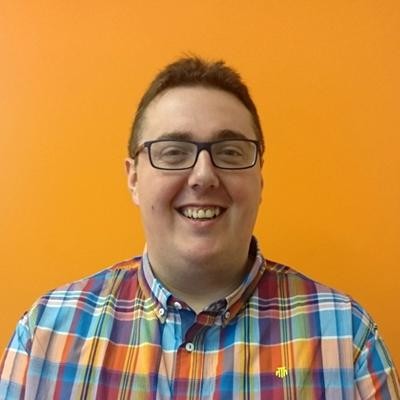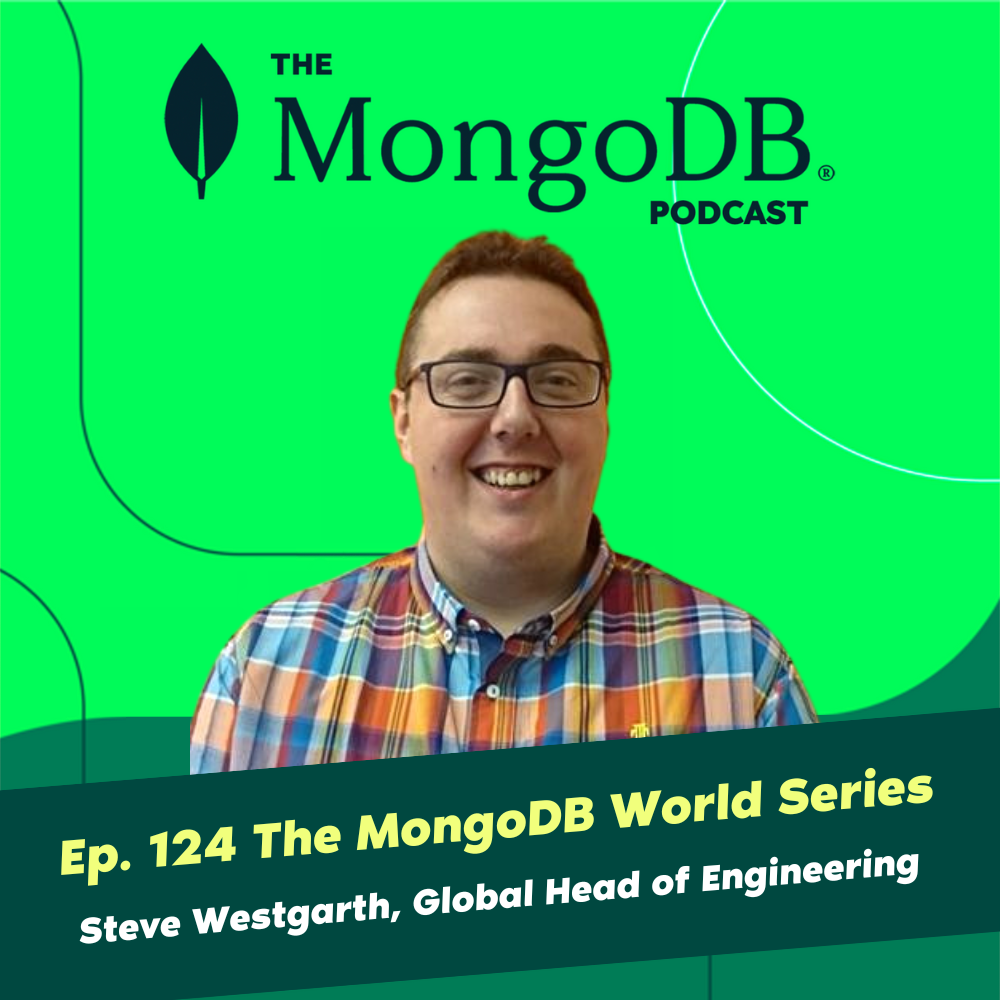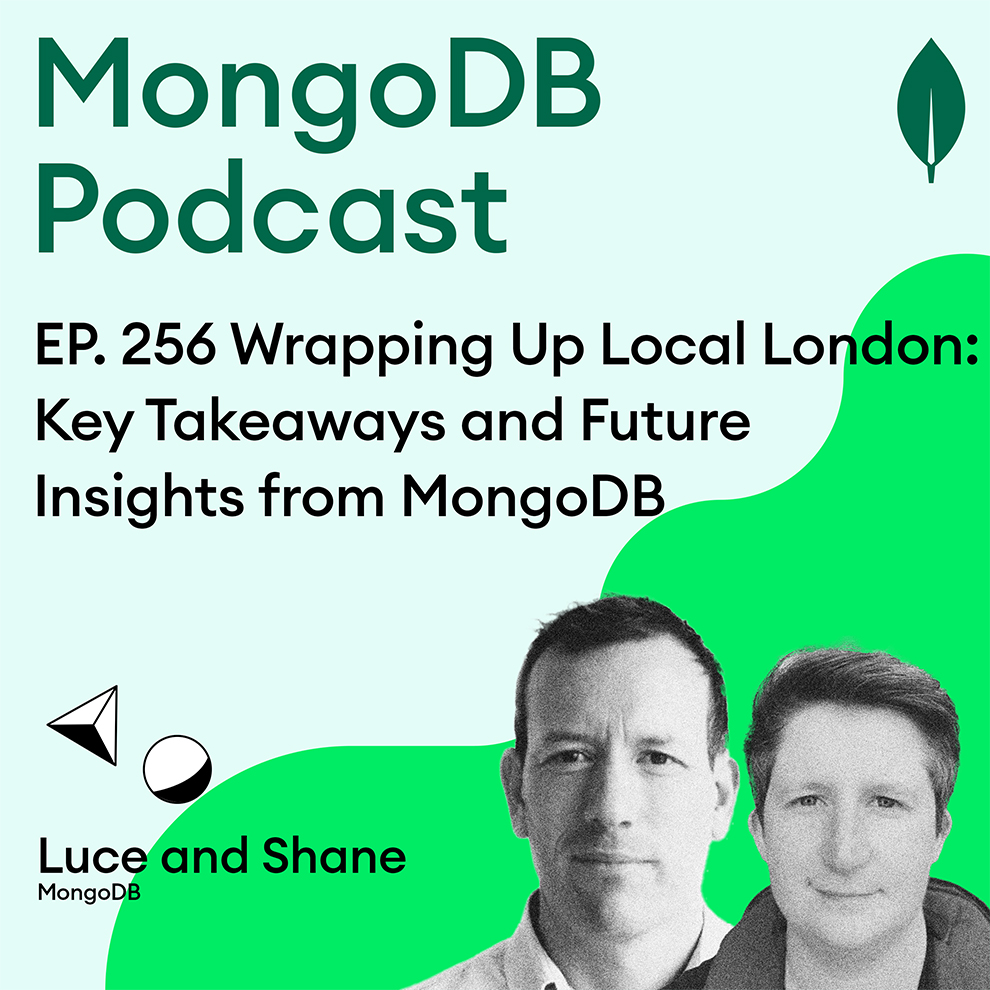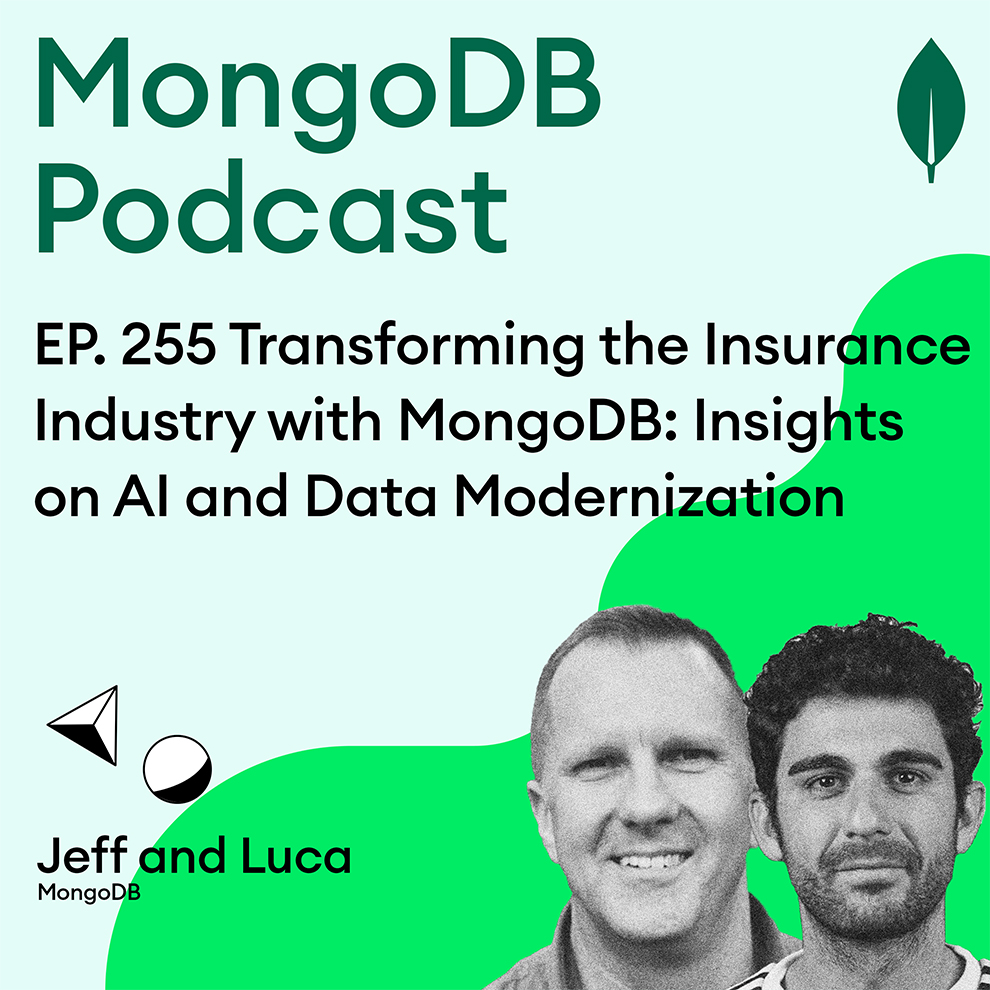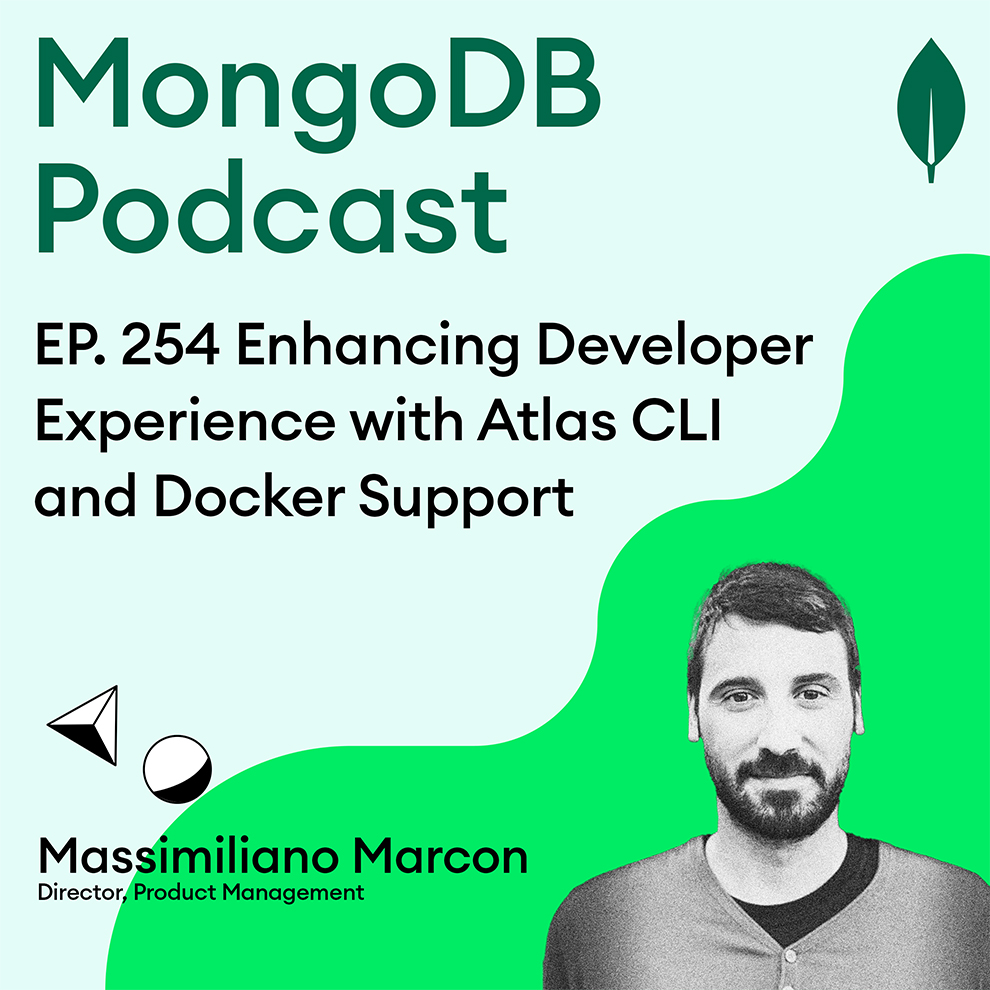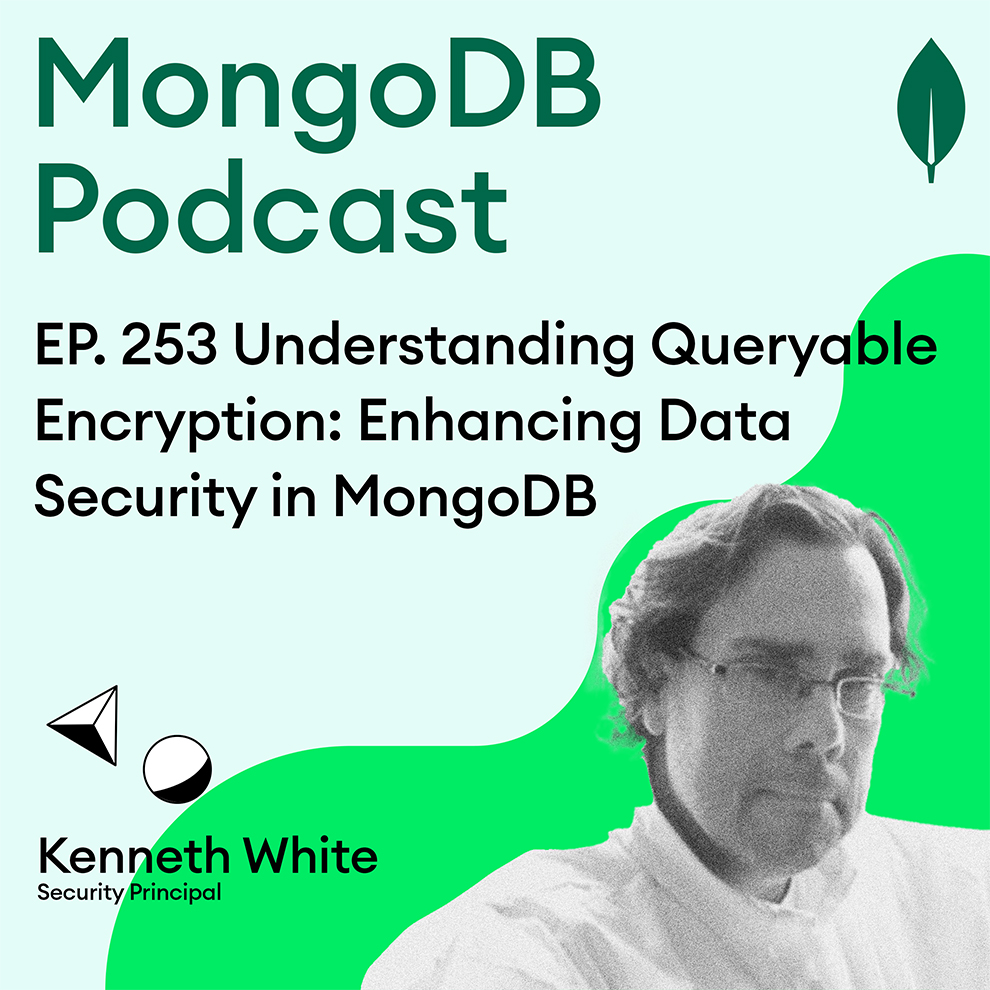Ep. 124 The MongoDB World Series - Steve Westgarth from Haleon
- 0.5
- 1
- 1.25
- 1.5
- 1.75
- 2
Shane McAllister: Welcome to the MongoDB podcast. As always, it's great to have you tune in and we're very glad for you to join us as well. My name is Shane McAllister, and once again, I'm not on my own. I'm joined by Cedric Clyburn, our intern here at MongoDB. Cedric, how are you?
Cedric Clyburn: Hey, Shane, I'm doing good as always. I'm here wrapping up some of my last projects for the summer at Mongo, so working on a YouTube guide, working on a inaudible recap to go in the culture blog, and you'll probably see that the intern episode, it just went out last week, which is super exciting. I was working really hard on that. And crazy, producing my own podcast, so that was really cool. Definitely give it a listen, if you haven't heard it. And now, we're all just working on our final presentations and our final projects to be presented next week. So yeah, very busy time.
Shane McAllister: Excellent. So the interns were let loose on their own podcast episode. I very much look forward to hearing that, and time flies, right? So you have a couple of weeks left and then you're back to college. I think we've one more podcast with you, Cedric. So we'll chat a little bit about your plans for college, etc., on the next one. But as before, this is our world series of podcasts. Here's another episode taken from the show for MongoDB World back in June. This time, we have Mike Lynn, as usual, is interviewing Steven Westgarth, who is the global head of engineering for GSK, or GlaxoSmith Kline, as you might know them. And you'll also hear about their transition to a brand new company, as well, which is super interesting. So, in this episode, Steven talks to Mike about leveraging technology into the consumer health care space. So, let's have a listen.
Steve Westgarth: Hi, my name's Steve Westgarth. I'm the global head of engineering for GlaxoSmith Kline. The company is soon to become Haleon, as we separate our consumer health division into a brand new company, which launches in July this year. And I'll be responsible for building all consumer health related products right across the globe.
Michael Lynn: Wow. That's a big job.
Steve Westgarth: Yeah, it's a huge job. I mean, I think that it's also a really exciting opportunity, right? Because I think on day one, when Haleon launches, we become the largest consumer healthcare organization on the world. And I think the opportunity of you're really connecting customers, our patients, to healthcare professionals in new and innovative ways and really driving for that greater good, and actually looking at at how we can really help humanity to do your greater and better things. And it's going to be a really exciting journey I think, and a really good journey to be on.
Michael Lynn: Yeah. Terrific. Well, I wish you luck with that as it launches.
Steve Westgarth: Thank you.
Michael Lynn: I'm not sure when this podcast episode will launch, but we'll definitely want to get back and find out how the launch is going. But until then, let's talk a little bit about the MongoDB and GSK relationship. We go way back, right?
Steve Westgarth: We're actually not really that far, to be honest. So we've brought MongoDB into Haleon relatively recently as part of the emergence of our new platform strategy. So as a business, we are looking at how we can digitally transform and start to embrace Cloud native technologies in order to build new, interesting propositions for our customers and for our patients. And as we look at doing that, we're looking at how we can better leverage technology, make sure we've got best of breed technology at the heart of our business, providing capability that allows our engineering teams to iterate quickly and fast, to build propositions test, and learn from those propositions. And the things that work, we'll invest in and absolutely run after. Things that don't work, we can shut them down and we don't need to worry about them. I think one of the challenges we've had historically is that, while people have very much thought about products, they've thought about products in silos. So you're looking at silo towers and haven't really thought about how that capability can come together and can really sit across the whole of the organization. So as we started to think about that and think about how we can bring data to the heart of what we do, Mongo becomes really important to us because it's going to be the database that powers are our platform that becomes your data store of choice for all of our operational data that's being built out in our Cloud native stack. And there are a number of reasons. When we were looking at technologies to do that, there are obviously a lot of NoSQL databases out there and a lot of different technologies that can do that. But I think for me, I'm the global head of engineering, right? So I'm all about developer experience and making sure we get developer productivity to where it needs to be. And what I really think is Mongo have really thought about how to create a great engineering experience and how to make sure engineers are really at the heart and forefront of our strategy so that they're getting the most out of the product. And then I think in addition to that, some of the features of MongoDB are more mature than a lot of other products. So the example I often give is around field level encryption, for example. Now Mongo's done that for some time within the product, a lot of competitors haven't. But from our point of view, thinking about PII data, how we protect that data, make sure that it's encrypted and encrypted in the database so that your bad actors can't get access to it. It's so important to us. And having worked with other products and looked at how we've maybe had to bring in third party providers or third party products in order to enable that functionality, it adds a lot of complexity to the developers flow. And for me, what we want to do is abstract that away and say," Engineers, don't worry too much about that. We've got that covered. It's already in the base product. You focus on the application code that's actually going to differentiate us and do different things." And I think your Mongo does things like that very, very well. So it works really well for us in that sense.
Michael Lynn: Yeah. So it's a new start, Haleon, with the engineering expertise of a large organization.
Steve Westgarth: It is to a large extent. So, I mean, it's a divestiture. So we are divesting Haleon into brand new company, which will be floated onto the stock market and all of those things. I mean, it's a huge company by any stretch of the imagination, but I think that within Haleon, we have the opportunity here to build a new engineering team really from the ground up. So we're very much taking a startup mentality and kind of thinking about how we can bring lots of the features you would find in a startup, and kind of build that into our organization structure and not be too constrained by legacy. We obviously have a lot of legacy tech, as every large organization will, and we will have to continue to interface with that, but we're trying not to let that define who we are. And I think that's really important to where we want to head to and what we want to do.
Michael Lynn: What an exciting opportunity, You've got great talent and you get the opportunity to redefine how you're going to be able to build applications from the ground up.
Steve Westgarth: Absolutely.
Michael Lynn: And what's the mission at Haleon?
Steve Westgarth: So the mission is all about everyday health with humanity. I think that, as a consumer healthcare organization, we've been providing products, things like Sensodyne and toothpaste and many other things that everybody will be familiar with, for many, many years. But I think what this is about doing is actually seeing how we can see that bigger picture. You know, it's how we can take digital product, how we can leverage technology in new and interesting ways to really help people and to really cut to the heart of what they do. I mean, people interact with our products every day. We touch the lives of so many people, but actually some of these big problems that humanity has is so, so important. Actually at MongoDB world this week, I attended a fantastic talk yesterday, which was given by a guy who had started a started working in the healthcare space. And he was developing a product which really helped people to engage with addiction services in the U. S. health service quicker, faster, and provided much better service to them. He told a fantastic story. He was an addict himself. He was recovering and he'd taken that problem from his personal lived experience and said," You know what, we can use technology and we can do a much better job if we introduce that." And I think that listening to that story and listening to the passion with which he spoke, imagine now taking a company that's got the resources that we've got behind us and saying," Well, what problem are we going to focus on? How can we help people to do something different with our technology?" And absolutely, commerciality will have to come into the equation somewhere, but that's not the driver for this. This is about connecting your everyday health with humanity, and helping to evolve healthcare, and really help the healthcare industry to get more organized. I think if you, if you think about healthcare as a sector, it's, certainly in the UK with the NHS, maybe we're a little bit beyond this now, but you are still in a world where if you go into hospital, the hospital effectively posts your hospital record back to your GP and your GP is responsible for storing it. Now, I mean, that's huge. The NHS is going on a big digitization journey and all of those things. But if we can help in some small way to connect patients and to create a better healthcare journey for them, I think there's huge power in that. And it's going to be fascinating to see what role we can play in that world.
Michael Lynn: Yeah. Super exciting. So Haleon will leverage MongoDB going forward. And will you leverage MongoDB in Atlas?
Steve Westgarth: Yes. So we're going to use Atlas. I think huge benefits to us in doing that. I think that the multi- Cloud approach is definitely part of our thinking and some of the benefits that Atlas brings is very good. But also, it's about taking away from us the things we don't need to worry about. I want my engineers to be focused on solving the big problems that I'm talking about. I don't want them to focus on being DBAs. And by leveraging Atlas, that allows us to actually make sure that the people who know database, they can do database really well. And that's the folks of Mongo who are running that and all of those things. Whereas, our engineers can focus on what they do really well. As part of that, we need to make sure we've got the right engineers with the right skills and the organization right. And I think that, I guess like any organization recruiting new engineers who are excited about working in organizations is very challenging. But I think it allows us to hopefully focus those efforts on getting people to work on exciting problems and not the boring space that nobody really wants to work on.
Michael Lynn: Yeah. I would think it shouldn't be difficult to hire folks with a mission like Haleon's.
Steve Westgarth: Yeah. And I totally agree. Part of this is also about us getting out there and actually letting people know what we're doing. Because right now on day one, Haleon is a brand new company that literally nobody will have ever heard of. So I, myself, run a podcast every Sunday called The Engineering Leader, where I do a talk to engineering leaders cross industry, and we talk about good practice, help engineers to raise the bar, and sharing that shared experience. And I think that helps us to really evangelize about what we're doing in our organization, but also what other people are doing in their organizations, too. Because I think as an industry, we don't actually talk cross- company enough. We tend to be very much in our own silos, doing our own thing. And it's really important to us to help start that conversation and make sure that we're getting people to talk about the right things at the right time.
Michael Lynn: Yeah. Okay. So one more time. The title of the podcast?
Steve Westgarth: The title of the podcast is The Engineering Leader.
Michael Lynn: Okay.
Steve Westgarth: It goes out every Sunday, and it's available on all major podcast platforms, Apple, Google, Spotify. And if anyone's got any feedback or questions, would love to hear from you if you find me on LinkedIn or Twitter.
Michael Lynn: Yeah. So we'll post links in the show notes. Now, going back to what you talk about on that, I'm kind of curious. The great resignation has happened and folks are walking away from engineering as a career.
Steve Westgarth: Yeah.
Michael Lynn: That's a big challenge. And engineering in general, it's all about solving problems. It is a difficult job by its very nature. What other challenges do you think engineering leaders are facing today?
Steve Westgarth: I think we have a huge number of challenges in the industry. I think Mark Porter actually said it yesterday in his keynote, he was talking around the number of extra engineers that we need in the industry within the next five years. And in the U. S. alone, I think he quoted something like 400, 000 additional engineers are needed, compared to what we've actually got coming through your academia, through school programs or whatever. So I think getting engineers with the right skills is hugely challenging. I mean, you're right. We are fortunate because we've got a fantastic mission and a really great opportunity, but not everybody wants to work with us. There's also lots of companies that also got fantastic missions. So there's a lot of competition out there for people who want to work. I think as well, in my role, it's not just about bringing any engineer into the mix, either. There's a huge thing about building the right team with the right team culture and the right attitudes, the right diversity, and the right mix of skills and wanting to be there. It's a real challenge to do that against a backdrop of not having enough people in the industry who actually want to come play ball. I think you are right in saying that there's a great number of challenges that we've got to focus on. And I think that outside of recruitment, I think that the speed with which technology is evolving is hugely important to us. I think that even, if you look at the speed of what Mongo's doing. Literally every six months, you're seeing new product announcements coming out from the business, and keeping pace with that stuff is incredibly challenging. And that's only one product. If you look at what's happening in Azure or in Google Cloud or in AWS, or the products that we use every day. Follow JavaScript, follow Swift, follow whatever language you're doing. Keeping pace with that and actually getting engineers to focus on up- skilling in the right areas, I think is hugely important. And you mentioned engineers walking away from organizations. And I think that's also possibly why that happens because engineers can of get pigeonholed into they have the skills in this technology or that technology, or we can't possibly let you move off that product because then we'd lose this. And engineers look at that and go," But I don't want to work there." And actually your engineers have the choice here. So we need to work our ways to be flexible, to let engineers work with the technologies that they want to work with. And to some degree, we all need to take responsibility for that. Because if we don't, engineers will go and find jobs where they can work in the technologies they want to work with. Or if they don't want to work with that technology anymore, they'll go and learn something else. And then off they'll go. These are skilled people who've got some fantastic ideas. And we need to treat that with respect and understand what are their drivers? These are not just people who are writing code for the sake of writing code. They've actually got really vibrant careers ahead of them.
Michael Lynn: Yeah. For sure. Well, Steve, it's been a great chat. Is there anything else you'd like to let the folks know about Haleon or your podcast or anything else?
Steve Westgarth: Yeah, I'm really keen to connect with engineering leaders, so as I mentioned before, I think that as an industry, we don't talk enough. I think that lots of people are doing really interesting things and solving problems, but actually we're all much better by sharing our common problems and helping each other to collectively solve them. Many of us are in non- competing industries where we're not worried about competition or giving away trade secrets. We're in a world where we're trying to build great engineering teams to ultimately build great product for our customers. So what I'd say is, I am on LinkedIn. You can find me @ SteveWestgarth. You can also find me @ SteveWestgarth on Twitter. If you are working in an organization or maybe you've got some problems you want to talk to an engineering leader about, I'm really keen to connect with people and spark that conversation. And maybe we can bring some individuals together and see how we can support each other because I think that not one person has all of the answers to everything. I certainly don't. And really keen to see if we can connect people together and see if we can collectively make the world a bit of a better place.
Michael Lynn: I love it. I love the mission. Steve, we'll connect for sure. And for folks listening, I'm going to include links in the show notes. So make sure you check out podcasts @ Mongodb. com. We'll have links in the show notes, links to The Engineering Leader podcast, and Steve Westgarth. Right?
Steve Westgarth: Perfect. That's right.
Michael Lynn: Okay, Steve.
Steve Westgarth: Awesome. It's been a pleasure talking to you.
Michael Lynn: Thank you so much, Steve.
Steve Westgarth: Thank you so much for having me on the show.
Michael Lynn: Yeah, thank you.
Shane McAllister: Great to hear about Haleon's human approach and evolving healthcare journey. And as a side note, also how they use MongoDB, obviously. But more particularly, from my point of view anyway, is how MongoDB helped them take away the things they don't need to worry about. And that carries across every customer or client that we listen to or interview, as well, too. So it leaves their engineering teams and their engineers time to focus on what they do really well. And I think for me, Cedric, that was probably the biggest thing I took away from that interview. But also, I think, and you would agree maybe, Steve is a very good podcast interviewee because he's well used to podcasting, having his own podcast.
Cedric Clyburn: Absolutely. When he said that at the end of the interview, I knew.
Shane McAllister: It made sense, right? He was a very good interviewee.
Cedric Clyburn: It made sense, radio voice and everything. So yeah, we'll have to check out his podcast every Sunday.
Shane McAllister: Every Sunday. The Engineering Leader, correct? That's Steve's podcast. So must add that to my subscription. And talking about adding things to your subscription, what's our plug, Cedric, we usually try and sneak in at the end of every episode?
Cedric Clyburn: Well, as always, of course, remember to review and subscribe. Links are in the show notes. And stay tuned for our next, and last episode, from MongoDB World. So from me, Cedric-
Shane McAllister: And me, Shane McAllister, it's been a pleasure. Talk to you soon.
DESCRIPTION
In this conversation from the MongoDB World Series event, Steve Westgarth speaks with MongoDB Principal Developer Advocate and host, Mike Lynn about his role at Haleon and how the company is leveraging MongoDB products, including Atlas. Haleon's mission is to empower everyday health, and while the company operates with a startup mentality, it was formerly part of GSK, and is a divestiture from the company.
Conversation highlights:
- [01:46] Steve Westgarth of GSK, Haleon
- [02:58] MongoDB and GSK's relationship, implementation in Haleon
- []05:38 Haleon as a divestiture and its startup mentality
- [06:40] Haleon's mission for everyday health
- [08:59] How Haleon will leverage MongoDB and Atlas
- [11:16] The great resignation and challenges facing engineering leaders
- [14:15] What Steve wants you to know about Haleon
Today's Host
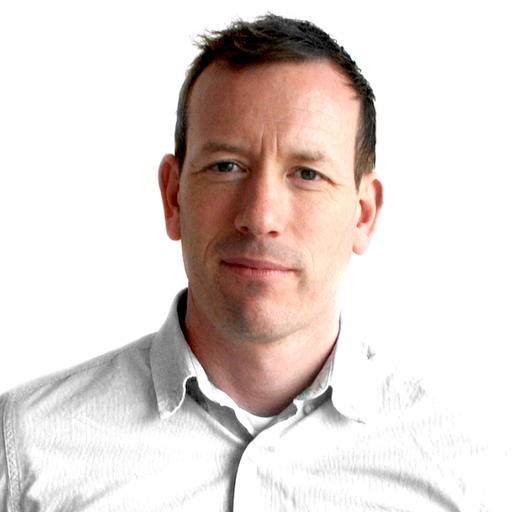
Shane McAllister
Today's Guests
